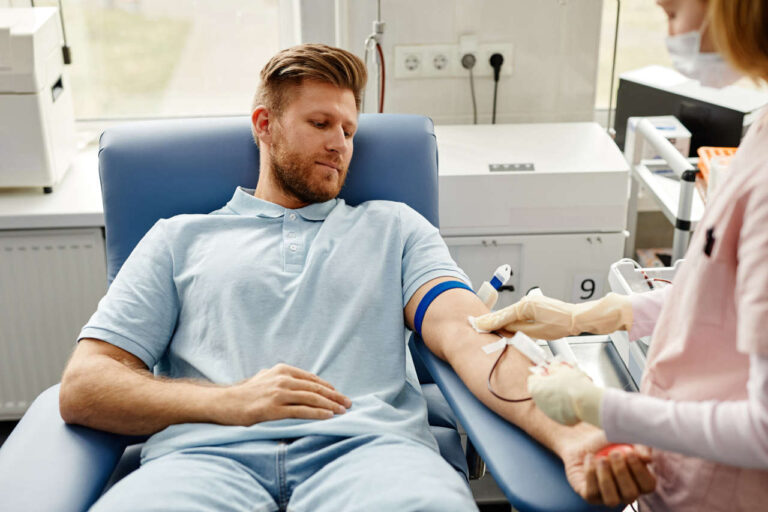
Several studies suggest a connection between intravenous immunoglobulin (IVIG) and meningitis, however, a direct cause-and-effect relationship is lacking.
Speak to a Specialist About Copay Assistance
This article discusses the possible connections between IVIG and meningitis. We will also learn about the symptoms, diagnosis, treatment, and prevention of IVIG-induced meningitis.
IVIG and Meningitis: What Is IVIG-Induced Meningitis?
Meningitis is a rare but potentially severe IVIG side effect. IVIG-induced meningitis can cause the membranes surrounding your brain and spinal cord (meninges) to become inflamed.
People with this condition have negative bacterial cultures, and it is considered a type of drug-induced aseptic meningitis.
Studies estimate nearly 7 cases of meningitis per 10,000 IVIG infusions [1].
Why Does IVIG Cause Aseptic Meningitis?
Though studies suggest a link between IVIG and meningitis, why and how IVIG can cause aseptic meningitis is still unclear.
Researchers believe several mechanisms may be involved, such as:
- Small amounts of IVIG can leak into the cerebrospinal fluid (CSF), triggering an inflammatory response.
- Immunoglobulins may have a direct toxic effect on the meninges.
- Ingredients in the IVIG preparations, such as stabilizing agents, can trigger hypersensitivity reactions.
- IVIG therapy may elicit the release of molecules that regulate immune response (cytokines).
The following factors may also increase the risk of aseptic meningitis after IVIG infusions [2, 3]:
- Rapid, high-dose infusion
- History of migraine
- Dehydration
- Prior exposure to blood products
- Possibly systemic lupus erythematosus (SLE)
- Being female
Symptoms
Symptoms tend to occur within 48 hours of infusion and are usually mild and self-limiting. The main symptoms include [4]:
- Headache
- Neck stiffness/pain
- Extreme light sensitivity (photophobia)
In some people, the following additional symptoms may be present:
- Nausea
- Vomiting
- Fever
- Sore throat
How Is IVIG-Induced Meningitis Diagnosed?
IVIG-induced meningitis is a diagnosis of exclusion. This means your doctor will confirm the diagnosis only after ruling out other medical conditions with similar symptoms.
Your doctor will assess your medical history, conduct a physical exam, and order tests, such as:
- A CSF analysis, which uses a sample of the cerebrospinal fluid to diagnose diseases of the central nervous system (CNS). In people with IVIG-induced meningitis, protein levels in the CSF rise, whereas sugar levels drop.
- Blood cultures, which use a sample of your blood to check if specific microorganisms are present. A negative blood culture means the symptoms are likely caused by IVIG.
Get IVIG Copay Assistance
IVIG Financial Assistance
How To Treat Aseptic Meningitis From IVIG?
Though symptoms can resolve without treatment in most cases, early detection and management are crucial to prevent potential long-term consequences.
The symptoms usually go away within 2 to 3 days with supportive treatment, which includes:
- Anti-allergy drugs
- Painkillers
- Drugs to treat nausea and vomiting
As a precautionary measure, your doctor will prescribe an antibiotic immediately after your symptoms appear, and usually, they will stop antibiotic therapy after negative blood cultures.
If the signs of aseptic meningitis appear during an infusion, your doctor will discontinue treatment. You should feel better within 48 hours after cessation.
Therapy may be reintroduced at a lower initial dosage or reduced infusion rate.
Other treatment measures can include changing the IVIG brand or switching to SCIG (subcutaneous immunoglobulin).
Can You Prevent IVIG-Induced Meningitis?
The following steps can help prevent or reduce the risk of developing IVIG-induced meningitis:
- Reducing infusion rate
- Lowering initial dosage
- Maintaining proper hydration
- Premedication with acetaminophen, anti-allergy drugs, and corticosteroids
REFERENCES:
- Kretowska-Grunwald, Anna et al. “Intravenous Immunoglobulin-Induced Aseptic Meningitis-A Narrative Review of the Diagnostic Process, Pathogenesis, Preventative Measures and Treatment.” Journal of clinical medicine vol. 11,13 3571. 21 Jun. 2022, doi:10.3390/jcm11133571
- Jain, Rajendra Singh et al. “Acute aseptic meningitis due to intravenous immunoglobulin therapy in Guillain-Barré syndrome.” Oxford medical case reports vol. 2014,7 132-4. 29 Oct. 2014, doi:10.1093/omcr/omu051
- Graça, L., Alves, J., Nuak, J. et al. Immunoglobulin-induced aseptic meningitis: a case report. BMC Neurol 18, 97 (2018). https://doi.org/10.1186/s12883-018-1102-8
- Bharath, Vighnesh, et al. “Incidence and Natural History of Ivig-Induced Aseptic Meningitis: A Retrospective Review at a Single Tertiary Care Centre.” Blood, vol. 124, no. 21, Dec. 2014, p. 2884. https://doi.org/10.1182/blood.v124.21.2884.2884.













